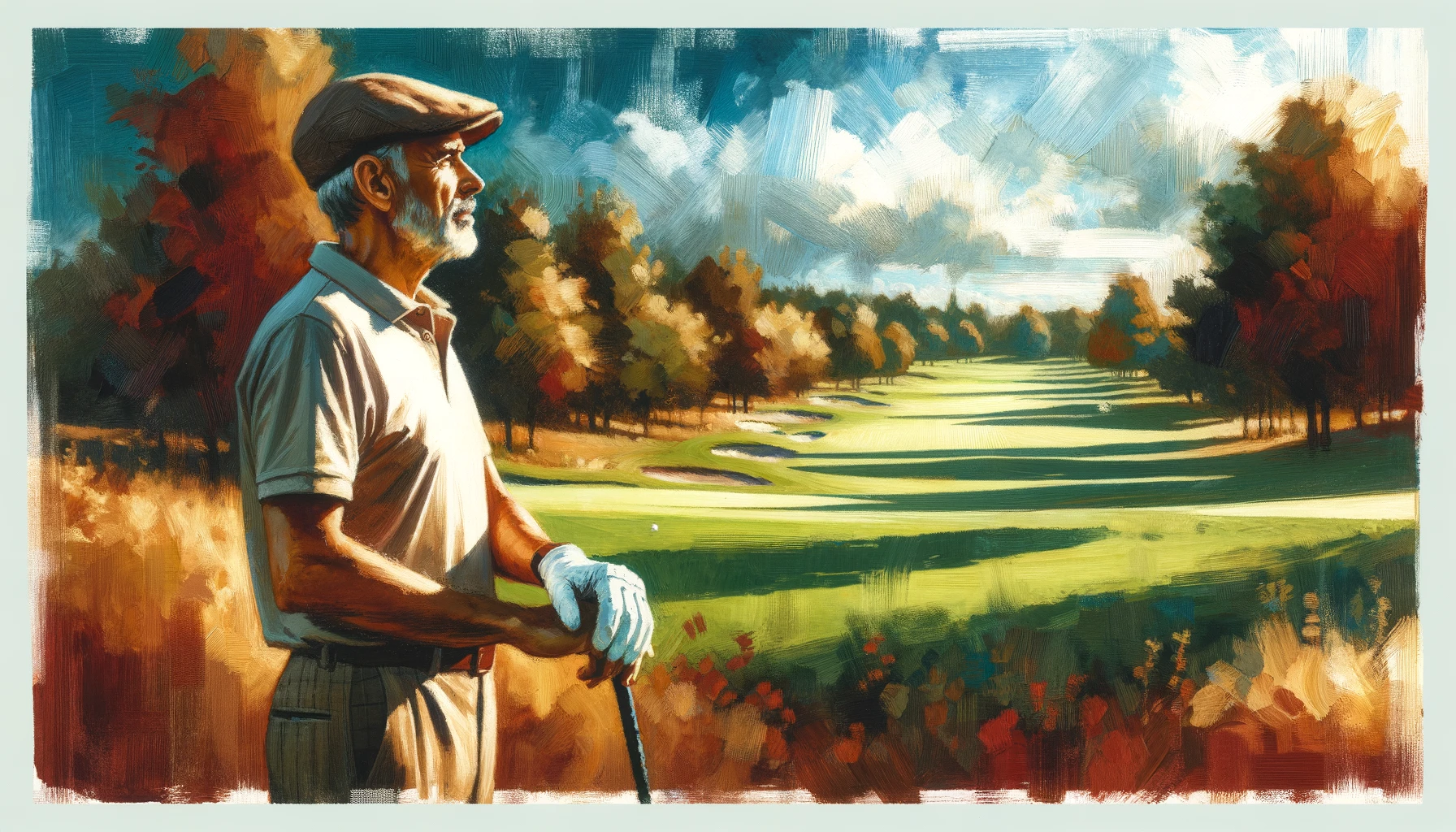How Weekend Golfers Can Start Participating in Competitions
Participating in competitions can transform your golfing experience, but where do you start? This guide covers everything from setting SMART goals to seeking expert feedback, ensuring you're prepared for your next tournament. Discover actionable tips, personal anecdotes, and a comprehensive FAQ section to help you hit the ground running in your competitive golf journey.
As a weekend golfer, I've always dreamed of stepping up my game and competing in advanced competitions. The thrill of standing on the first tee, knowing I'm about to test my skills against other passionate golfers, is both exhilarating and nerve-wracking. But, like many of us, I faced several challenges that made this dream seem out of reach.
The fear of humiliation, inconsistent performance, and the daunting task of figuring out where to start were my biggest obstacles. I wanted to lower my score, impress my buddies, and earn bragging rights in the clubhouse. The frustration of not knowing the secrets the pros use, coupled with the desire to hit those long, towering drives, made me feel stuck. I knew I needed a structured approach to bridge the gap between my current skills and the competitive level I aspired to reach.
That's when I discovered that participating in competitions doesn't mean you have to be a pro. It's about weekend golfers like us starting to play and compete in local tournaments and leagues. With the right strategies, mindset, and a bit of insider information, we can all take our game to the next level. In this article, I'll share how you can start competing in competitions, set SMART goals, and seek feedback from more experienced players to continuously improve.
Ready to transform your golf game?
Let's dive in!
 A passionate weekend golfer on a serene course, embracing the challenge.
A passionate weekend golfer on a serene course, embracing the challenge.Compete in Competitions: Tips for Weekend Golfers
As an avid weekend golfer, I always dreamed of competing in tournaments, but my inconsistent performance and lack of confidence held me back. Every time I stood on the first tee, the fear of humiliation overshadowed my love for the game. I desperately wanted to lower my score, impress my buddies, and finally earn those bragging rights in the clubhouse.
Determined to change, I began researching ways to improve my game. I invested in new equipment, spent countless hours practicing, and sought advice from anyone willing to help. Despite my efforts, progress was slow, and I often felt frustrated and stuck. The breakthrough came when I stumbled upon a local amateur tournament. The idea of competing against others, regardless of their skill level, ignited a new spark of motivation.
Participating in that first tournament was a game-changer. I realized that competitions weren't just for seasoned golfers; they were an opportunity for golfers like me to test our skills, gain experience, and grow. This revelation opened my eyes to a new world of possibilities and set me on a path toward continuous improvement.
To ensure my success in these competitions, I developed a structured approach I now call the Golfer's Growth Journey: Fairway Mastery Blueprint. This 5-Step System includes setting SMART goals, seeking feedback from experienced players, creating a detailed practice plan, focusing on mental and physical fitness, and learning the rules and etiquette of competitive play. This framework provided the guidance and structure I needed to transform my game.
Through dedication and following my Fairway Mastery Blueprint, I transformed from a hesitant weekend golfer into a confident competitor. My scores improved, I gained invaluable experience, and I even started winning a few local tournaments. The biggest reward, however, was the newfound confidence and passion for the game. Competing in tournaments not only enhanced my skills but also enriched my golfing experience and social connections.
Ready to start your journey? Let's dive into the Golfer's Growth Journey: Fairway Mastery Blueprint and transform your game too!
 Experience and passion merge on the golf course for this weekend warrior.
Experience and passion merge on the golf course for this weekend warrior.How Can Weekend Golfers Start Competing in Competitions?
Starting to compete in competitions as a weekend golfer might seem intimidating, but it’s absolutely within reach. When I first considered entering local tournaments, I was overwhelmed by the thought of competing against more seasoned players. However, I soon realized that with the right approach, it’s possible to step up to competitions and enjoy every moment of it.
Firstly, it's important to understand that local tournaments and leagues are designed for golfers of all levels. These events are fantastic opportunities to test your skills, meet new people, and have fun. My first step was to research and find local amateur tournaments.
Once you've identified a few competitions, it’s crucial to prepare mentally and physically. I started by setting realistic goals for myself. Instead of focusing on winning, I aimed to improve my personal best and enjoy the experience. This shift in mindset reduced the pressure and allowed me to perform better on the course. Remember, the primary goal is to enjoy the game and learn from the experience.
Joining a local golf league can also provide regular competitive play and camaraderie. When I joined my local league, I not only got to play more often but also received valuable feedback from more experienced players. This feedback was instrumental in identifying areas for improvement, such as my short game and putting skills.
Preparation is key to success in any competition. I dedicated time to practice sessions focusing on different aspects of my game. Creating a practice schedule that includes driving, iron play, short game, and putting helped me become a more well-rounded golfer. Additionally, playing practice rounds on the courses where tournaments were held gave me a significant advantage. Familiarity with the course layout, hazards, and greens can boost your confidence during the actual competition.
Don’t underestimate the power of seeking advice and coaching. Many experienced golfers are happy to share their knowledge and tips. I took lessons from a local pro who helped refine my swing and strategy. This professional guidance not only improved my technical skills but also boosted my confidence.
Another vital aspect is understanding the rules and etiquette of competitive play. Make sure you are well-versed in the rules of golf, as well as the specific regulations of the tournaments you enter. Knowing the rules can prevent unnecessary penalties and ensure a smooth experience during the competition.
Lastly, stay positive and patient. Competing in advanced competitions is a learning process. There will be days when things don’t go as planned, but every round is an opportunity to learn and grow. Celebrate your progress, no matter how small, and keep pushing forward.
By following these steps, I was able to transition from a casual weekend golfer to someone who competes regularly in local tournaments. It’s a rewarding journey that has not only improved my game but also enriched my love for golf. So, gear up, stay focused, and dive into the exciting world of advanced golf competitions. You'll be amazed at how much you can achieve.
Ready to learn the best strategies for success in local golf tournaments? Let's dive in!
 A determined golfer takes on the serene course with confidence and skill.
A determined golfer takes on the serene course with confidence and skill.What Are the Best Strategies for Success in Local Golf Tournaments?
When it comes to local golf tournaments, having a strategy can make all the difference. I remember my first tournament like it was yesterday – the excitement, the nerves, and the overwhelming desire to perform well. Over time, I’ve learned several key strategies that have helped me succeed, and I'm excited to share these with you.
1. Set SMART Goals:
- Specific: Clearly define what you want to achieve. For me, it was reducing my handicap by three strokes.
- Measurable: Track your progress. Keeping a detailed scorecard and noting areas for improvement helped me stay focused.
- Attainable: Set realistic goals. I knew dropping my handicap by ten strokes in one season was unrealistic, but three was achievable.
- Relevant: Ensure your goals align with your overall ambition to compete effectively.
- Time-bound: Set a timeline. I aimed to achieve my goal by the end of the tournament season.
2. Know the Course:
Before any tournament, I make it a point to play a practice round on the course. This familiarity helps me strategize my shots, understand the greens, and avoid hazards. Walking the course also gives a different perspective compared to just riding a cart.
3. Develop a Pre-Shot Routine:
Consistency is key in golf. Developing a pre-shot routine has been one of the most effective strategies for me. Whether it’s taking a deep breath, visualizing the shot, or a specific number of practice swings, having a routine helps calm nerves and focus on the shot at hand.
4. Mental Preparation:
Golf is as much a mental game as it is physical. Staying positive, managing stress, and maintaining focus are crucial. I practice mindfulness techniques and visualization before each round. Imagining successful shots and calm responses to potential setbacks prepares my mind for the game.
5. Stay Physically Fit:
Physical fitness can greatly impact your performance. I incorporated a fitness routine focusing on flexibility, strength, and endurance. This not only improved my swing but also my stamina during long rounds.
6. Course Management:
Playing smart is often better than playing aggressively. I learned to manage the course by avoiding unnecessary risks, aiming for safe targets, and knowing when to lay up. This strategic approach has saved me numerous strokes.
7. Short Game Mastery:
The short game is where you can save the most strokes. I dedicated extra practice time to chipping, pitching, and putting. Techniques like the bump-and-run and mastering different putting distances significantly improved my scores.
8. Seek Feedback and Learn:
After each tournament, I review my performance, noting what worked and what didn’t. Seeking feedback from fellow golfers and coaches has provided valuable insights. This continuous learning process has been instrumental in my improvement.
9. Stay Hydrated and Nourished:
It might seem basic, but staying hydrated and having the right snacks during a round keeps your energy levels up. Dehydration and hunger can negatively affect concentration and performance.
10. Have Fun:
Lastly, remember why you play golf – for the love of the game. Enjoying the process, celebrating small victories, and staying passionate make the journey worthwhile.
By implementing these strategies, I’ve seen a significant improvement in my performance in local tournaments. It’s all about preparation, mindset, and continuous learning. These strategies will not only help you perform better but also make the experience more enjoyable.
Ready to prepare for your next regional amateur tournament? Let's explore how you can get ready to shine!
How Do Amateur Golfers Prepare for Regional Amateur Tournaments?
Preparing for a regional amateur tournament requires dedication, strategy, and a lot of practice. I remember the first time I signed up for one; the excitement was quickly overshadowed by the realization of how much preparation was needed. Here’s how I managed to get ready and what you can do to ensure you’re fully prepared for the big day.
1. Create a Detailed Practice Plan:
- Break down your practice into specific areas: driving, iron play, short game, and putting.
- Allocate time each week to focus on each aspect, ensuring a balanced approach to your game.
2. Play Practice Rounds:
- If possible, play practice rounds at the tournament course. This familiarity with the layout, hazards, and greens is invaluable.
- Take detailed notes on each hole, including yardages, preferred landing spots, and potential trouble areas.
3. Focus on Physical Fitness:
- Incorporate exercises that improve flexibility, strength, and endurance. This will help maintain performance throughout the tournament.
- Consider yoga or Pilates for flexibility and core strength.
4. Mental Conditioning:
- Use visualization techniques to imagine successful shots and positive outcomes.
- Practice mindfulness or meditation to stay calm and focused under pressure.
5. Equipment Check:
- Ensure all your equipment is in top condition. Check grips, shafts, and the condition of your golf balls.
- Make any necessary adjustments or replacements well before the tournament.
6. Nutrition and Hydration:
- Plan your meals and snacks for the tournament day. Opt for foods that provide sustained energy.
- Stay hydrated, starting a few days before the event to ensure you’re in peak condition.
7. Get a Good Night’s Sleep:
- Rest is crucial. Make sure you get a good night’s sleep leading up to the tournament. Being well-rested helps maintain focus and energy levels.
8. Course Management Skills:
- Develop a game plan for each hole based on your practice rounds. Decide when to play aggressively and when to play it safe.
- Stick to your plan during the tournament to avoid unnecessary risks.
9. Seek Advice and Feedback:
- Talk to other golfers who have experience in regional tournaments. Their insights can be incredibly helpful.
- Consider a session with a golf coach to fine-tune your skills and strategy.
10. Stay Positive and Enjoy the Experience:
- Maintain a positive attitude throughout your preparation and the tournament. Remember, every tournament is a learning experience.
- Enjoy the process and the opportunity to compete at a higher level.
One personal anecdote I recall vividly is my first regional amateur tournament. I was incredibly nervous, but I stuck to my preparation plan. The familiarity with the course, combined with my practice and mental conditioning, helped me stay calm and perform well. I didn’t win, but I played one of my best rounds and learned so much from the experience.
By following these steps, you can ensure you’re well-prepared for your regional amateur tournament. It’s all about combining physical readiness, mental toughness, and strategic planning.
What’s next on your journey to mastering advanced competitions? Let’s keep pushing forward and explore more tips and tricks!
 Capturing the essence of a weekend golfer competing with passion and precision.
Capturing the essence of a weekend golfer competing with passion and precision.Key Takeaways for Competing in Competitions
Participating in competitions can seem daunting, but with the right approach, weekend golfers like us can thrive. Here are the core actionable takeaways you can use immediately:
- Step Up Your Competition Level:
- It begins with entering regional amateur tournaments and local leagues, which means you get to test and improve your skills against other golfers without needing to be a pro.
- Research local tournaments and sign up for one that matches your skill level to start gaining competitive experience.
- Set SMART Goals:
- It involves setting Specific, Measurable, Attainable, Relevant, and Time-bound goals, which means you can track your progress and stay motivated.
- Example: Aim to reduce your handicap by three strokes over the next six months.
- Seek Feedback from Experienced Players and Coaches:
- It means learning from those who have more experience, which helps identify areas for improvement and gain valuable insights.
- Join a local league or take lessons from a golf pro to get personalized feedback.
- Prepare Thoroughly:
- It includes creating a detailed practice plan and playing practice rounds on the tournament course, which means you'll be more confident and familiar with the course layout.
- Develop a pre-shot routine to maintain consistency and focus during competitions.
- Focus on Mental and Physical Fitness:
- It involves incorporating exercises for flexibility, strength, and mental conditioning, which means you can maintain peak performance throughout the tournament.
- Practice mindfulness and visualization techniques to stay calm and focused under pressure.
Frequently Asked Questions About Participating in Competitions
How can a weekend golfer start participating in competitions?
How can a weekend golfer start participating in competitions?
Start by entering local amateur tournaments and joining golf leagues. These events are designed for players of all skill levels. Research local tournaments through golf associations or online platforms. Practice regularly, set realistic goals, and seek feedback from experienced golfers or coaches.
What are the best strategies for success in local golf tournaments?
What are the best strategies for success in local golf tournaments?
Success in local tournaments requires preparation and strategy. Set SMART goals, familiarize yourself with the course, develop a consistent pre-shot routine, and maintain physical and mental fitness. Focus on your short game, manage the course smartly, and stay positive throughout the competition.
How do I prepare for a regional amateur tournament?
How do I prepare for a regional amateur tournament?
Prepare by creating a detailed practice plan, playing practice rounds on the tournament course, and maintaining physical fitness. Mental conditioning, proper nutrition, and equipment checks are also crucial. Seek advice from experienced players and stay positive to ensure a successful tournament experience.
You're probably thinking you need to be a low handicap golfer to compete, right?
You're probably thinking you need to be a low handicap golfer to compete, right?
Well, actually, local and regional tournaments welcome golfers of all levels. It's about gaining experience and improving your game, not just winning.
What should I focus on during my practice sessions?
What should I focus on during my practice sessions?
Focus on all aspects of your game: driving, iron play, short game, and putting. Create a balanced practice schedule and dedicate extra time to areas where you need improvement. Playing practice rounds on different courses can also help you adapt to various playing conditions.
How important is mental preparation in golf competitions?
How important is mental preparation in golf competitions?
Mental preparation is crucial. Techniques like visualization, mindfulness, and maintaining a positive attitude can significantly impact your performance. Staying calm under pressure and focusing on each shot can help you perform at your best.
You're probably thinking you need a lot of time to prepare, right?
You're probably thinking you need a lot of time to prepare, right?
Well, with a structured practice plan and efficient time management, even a busy weekend golfer can prepare effectively for competitions.
What role does physical fitness play in competitive golf?
What role does physical fitness play in competitive golf?
Physical fitness enhances your performance by improving strength, flexibility, and endurance. Incorporate exercises like yoga or Pilates for flexibility and core strength. Staying fit helps maintain consistent performance throughout the tournament.
How can I manage my nerves during a competition?
How can I manage my nerves during a competition?
Develop a pre-shot routine, practice mindfulness techniques, and focus on your breathing. Visualize successful shots and remind yourself of past successes to boost confidence. Experience will also help you manage nerves better over time.
You're probably thinking it's too expensive to compete in tournaments, right?
You're probably thinking it's too expensive to compete in tournaments, right?
Well, many local tournaments have affordable entry fees. Additionally, the experience and opportunities for improvement make it a worthwhile investment in your golfing journey.
What should I do if I make a mistake during a competition?
What should I do if I make a mistake during a competition?
Stay positive and focus on the next shot. Every golfer makes mistakes, but it's how you recover that matters. Learn from each round and use it as an opportunity to improve.
What are the key benefits of participating in competitions?
What are the key benefits of participating in competitions?
Participating in advanced competitions helps improve your skills, provides valuable experience, and offers opportunities to meet other passionate golfers. It can also boost your confidence and motivate you to set and achieve new goals.
How can I find local golf tournaments to join?
How can I find local golf tournaments to join?
Research local golf associations, check online platforms, or visit golf course websites for information on upcoming tournaments. Joining local golf clubs and leagues can also provide information and access to various competitions.
Can I compete in golf tournaments without a low handicap?
Can I compete in golf tournaments without a low handicap?
Yes, many amateur and local tournaments are designed for golfers of all skill levels. You don't need a low handicap to participate; it's about gaining experience and enjoying the competition.
What should I expect at my first golf tournament?
What should I expect at my first golf tournament?
Expect a mix of excitement and nerves. Arrive early to get settled, warm up, and familiarize yourself with the course. Follow the rules and etiquette of the tournament, and most importantly, have fun and learn from the experience.
How can I improve my golf game quickly?
How can I improve my golf game quickly?
Focus on your short game, practice consistently, seek advice from experienced golfers or coaches, and maintain physical and mental fitness. Setting SMART goals and tracking your progress can also help you improve efficiently.
How do local golf leagues work?
How do local golf leagues work?
Local golf leagues typically involve regular competitions among members. They offer a structured environment for playing and improving your game. Joining a league provides opportunities for feedback, camaraderie, and regular competitive play.
What equipment do I need for a golf tournament?
What equipment do I need for a golf tournament?
Ensure you have a well-fitted set of clubs, plenty of golf balls, tees, a glove, and appropriate golf attire. Check your equipment for any necessary adjustments or replacements before the tournament.















